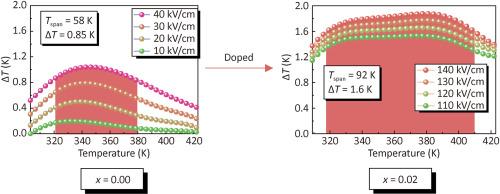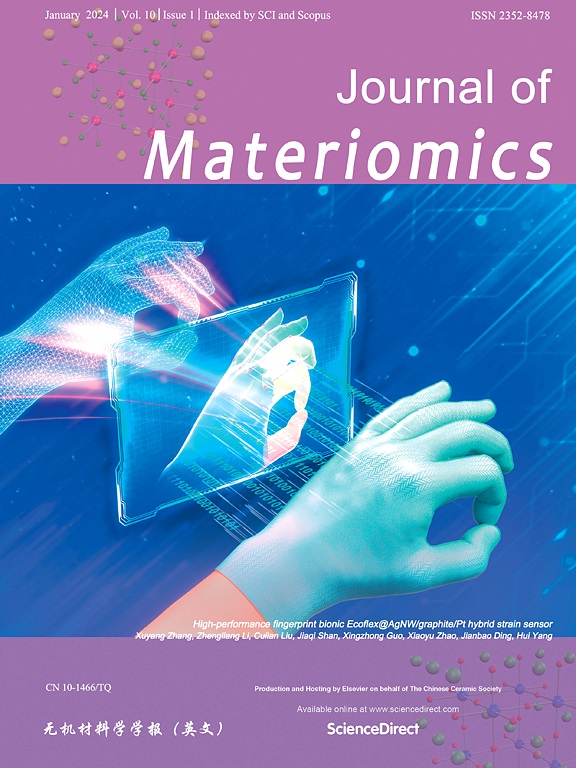Significantly enhanced electrocaloric effect by composition modulation in lead-free BaTiO3-based ceramics
IF 8.4
1区 材料科学
Q1 CHEMISTRY, PHYSICAL
引用次数: 0
Abstract
The electrocaloric effect (ECE) offers a pathway to environmentally sustainable and easily miniaturized refrigeration technology, positioning it as a front-runner for the next generation of solid-state cooling solutions. This research unveils a remarkable ECE in a finely tuned (Ba0.86Ca0.14)0.98La0.02Ti0.92Sn0.08O3 ceramic, exhibiting a temperature shift (ΔT) of 1.6 K across more than 85% of the maximum ΔT (ΔTmax) and spanning an exceptionally wide operational range of 92 K. Our investigation on dielectric responses and ferroelectric polarization-electric field (P–E) loops suggests that the broad operational scope results from the fragmentation of extended ferroelectric domains into smaller domains and polar nano-regions (PNRs) supported by PFM analysis. Furthermore, the introduction of La enhances spontaneous polarization by significantly extending the maximum electric field that can be applied, facilitating high-performance ECE at ambient temperature. This study positions BaTiO3-based lead-free ceramic as a sustainable alternative for addressing the cooling demands of modern electronic components, marking a significant stride toward next-generation solid-state refrigeration.

无铅 BaTiO3 基陶瓷中的成分调控显著增强了电致发光效应
电致冷效应(ECE)为环境可持续发展和易于微型化的制冷技术提供了一条途径,使其成为下一代固态制冷解决方案的领跑者。这项研究揭示了一种经过微调的 (Ba0.86Ca0.14)0.98La0.02Ti0.92Sn0.08O3 陶瓷中的显著 ECE,在超过 85% 的最大 ΔT (ΔTmax)范围内显示出 1.6 K 的温度偏移 (ΔT),并跨越 92 K 的超宽工作范围。我们对介电响应和铁电极化-电场(P-E)环路的研究表明,之所以能实现如此宽的工作范围,是因为扩展的铁电畴被分割成更小的畴和极性纳米区域(PNR),这一点得到了 PFM 分析的支持。此外,La 的引入通过显著扩展可施加的最大电场来增强自发极化,从而促进了环境温度下的高性能 ECE。这项研究将基于 BaTiO3 的无铅陶瓷定位为满足现代电子元件冷却需求的可持续替代品,标志着向下一代固态制冷迈出了重要一步。
本文章由计算机程序翻译,如有差异,请以英文原文为准。
求助全文
约1分钟内获得全文
求助全文
来源期刊

Journal of Materiomics
Materials Science-Metals and Alloys
CiteScore
14.30
自引率
6.40%
发文量
331
审稿时长
37 days
期刊介绍:
The Journal of Materiomics is a peer-reviewed open-access journal that aims to serve as a forum for the continuous dissemination of research within the field of materials science. It particularly emphasizes systematic studies on the relationships between composition, processing, structure, property, and performance of advanced materials. The journal is supported by the Chinese Ceramic Society and is indexed in SCIE and Scopus. It is commonly referred to as J Materiomics.
 求助内容:
求助内容: 应助结果提醒方式:
应助结果提醒方式:


